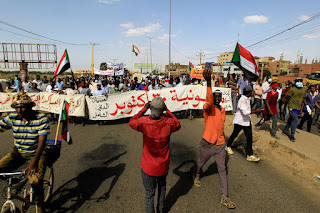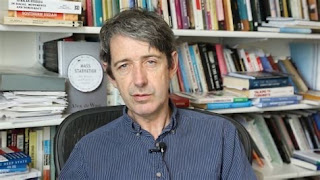NOTE from Sudan Watch editor: Although there is a lack of news about Sudan’s cabinet ministers, their current whereabouts and how well they are being treated, it is clear that the UN Security Council and many ambassadors and diplomats round the world are following events closely and doing everything possible to ensure Mr Hamdok and his detained ministers and politicians are being kept safe and well.
Shortly after the military coup, a news report stated that a cabinet minister had been arrested at home during the night and taken to an unnamed location still wearing his night clothes.
The following copy of a news report by AFP says PM Hamdok is quoted as saying "the release of the cabinet ministers and the full reinstatement of the government could pave the way to a solution”. The source of the quote is the Facebook page of Sudan’s information ministry.
The report reveals that the coup leader Gen Burhan said the detainees were being kept in "a decent place" and that those facing charges "will be moved to where the accused are usually taken while the rest will be released."
I have no verifiable news about current internet access in Sudan, cut off by the junta during the coup.
Here is a full copy of a news report written by Agence France-Presse (AFP)
Published at France24 dot com
Dated Monday, 1 November 2021, 9:23 pm
Sudan's ousted PM says solution hinges on return of govt: ministry
Sudan's ousted Prime Minister Abdalla Hamdok said Monday [Nov 1] the reinstatement of his government, dissolved in a military coup, could pave the way to a solution in the country, the information ministry said.
Hamdok spoke during a meeting at his home, where he is under effective house arrest, with the ambassadors of the United States, Britain and Norway, the ministry which remains loyal to the prime minister said.
On October 25, Sudan's top general Abdel Fattah al-Burhan dissolved the cabinet as well as the ruling joint military-civilian Sovereign Council which had been heading Sudan's transition towards full civilian rule following the 2019 overthrow of autocrat Omar al-Bashir.
In a move widely condemned internationally, Burhan declared a state of emergency and detained Sudan's civilian leadership, including Hamdok and members of his government.
Hamdok, an international economist, was later released and placed effectively under house arrest.
The ousted prime minister "insisted on the legitimacy of his government and transitional institutions", the information ministry said on its Facebook page.
He added that "the release of the cabinet ministers and the full reinstatement of the government could pave the way to a solution," the ministry said.
Hamdok, according to the statement, demanded that the situation in Sudan return to what it was before the coup, refusing to negotiate with the military rulers.
The statement added that the three ambassadors also informed Hamdok that the US special envoy for the Horn of Africa, Jeffrey Feltman, would arrive at dawn Tuesday in Khartoum "to pursue efforts to ease the crisis".
'Dangerous legal situation'
Earlier Monday [Nov 1] a Sudanese lawyer representing the detained civilian leaders said their whereabouts is unknown and that they are in a "dangerous legal situation".
Kamal al-Gizouli is the lead defence lawyer on a team of attorneys which has come forward to represent them with the backing of their families.
Gizouli said his team went to an agency "where they were believed to have been held but we found that they were not there."
Gizouli expressed concern about the well-being of the detainees and called on those holding them to reveal their location.
"These detainees are in the most dangerous legal situation" since nothing was known about their case nor who was heading the investigation, he added.
Little is known about the whereabout of his cabinet and the members of the council that had been tasked with paving the way to full civilian rule.
Burhan had since August 2019 chaired the council, working alongside Hamdok's government under a power-sharing deal that outlined the post-Bashir transition.
The arrangement came under strain, however, as splits deepened between the civilians and the military.
Jonas Horner, senior analyst for Sudan at International Crisis Group think tank, speaking to AFP earlier Monday, said Hamdok will "find that his political cache has been boosted" by recent events, "and that he is in fact strengthened from what was a relatively weak position previously."
Horner cited, for example, Hamdok's "principled stance" prior to the putsch in refusing to dissolve his government.
In a news conference last week, Burhan defended the military's takeover, saying it was "not a coup" but a move to "rectify the course of the transition".
The general also said the detainees were being kept in "a decent place" and that those facing charges "will be moved to where the accused are usually taken while the rest will be released."
Sudanese and international efforts have been made to mediate a way out of the crisis since the coup.
"We call on all sides mediating to resolve the crisis to demand that the whereabouts of these ministers and politicians be known," said Gizouli.
On Sunday, the UN special representative to Sudan, Volker Perthes, said options for mediation have been discussed with Hamdok and other Sudanese stakeholders.
Photo and caption: Sudan's ousted Prime Minister Abdalla Hamdok, pictured in September 2021, has been effectively under house arrest since the military coup (AFP/-)
bur-mon/hkb/it
View original: https://www.france24.com/en/live-news/20211101-sudan-s-ousted-pm-says-solution-hinges-on-return-of-govt-ministry





